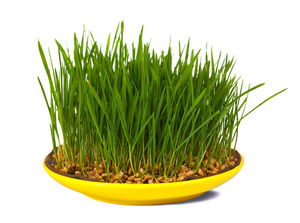Wheat Grass
| See Also | Food Supplements |
|---|
Cereal grasses, such as wheat grass and barley grass, are the young green plants that grow to produce cereal grain. Cereal grasses are often called "green foods" along with spirulina and chlorella.
Food Sources
Wheatgrass is the young grass of the wheat plant, Triticum aestivum. It grows in temperate regions throughout Europe and the United States and can live indoors or outdoors. Many people grow their own wheatgrass by putting wheat seeds in water and then harvesting the leaves.
Wheatgrass is a natural source of vitamins and antioxidants, including:
One ounce of wheatgrass juice is equivalent to the vitamin and mineral content of one ounce of fresh vegetables.
Uses
There are many potential uses for wheat grass. Since wheat grass contains chlorophyll, there is reason to believe that wheat grass exerts some of the same benefit as chlorophyll such as anticarcinogenic action.[1].
Some potential uses for wheat/barley grass include: [1]
- Prevention and treatment of cancer
- High cholesterol
- Hypertension
- Pollutant detoxification
- Radiation protection
- Low energy
- Low immunity
- Wounds to enhance healing
- Digestive aid
- Tooth decay and bad breath
- Aging to promote health skin and reverse greying hair
Prescribing Considerations
The only recommended dosage that has been established is for adults at 3.5 grams daily. To determine what your specific requirements are talk to your naturopathic doctor or other trained medical professional.
- Wheat grass and barley grass supplements are available as powder, in tablets, and as juice. They can also be found in combination with other "green-foods" such as spirulina and chlorella.
Safety
Barley grass and wheat grass are generally regarded as safe. The safety concerns noted include:
- Pregnancy and Breastfeeding
- Wheat grass and barley grass should be avoided during pregnancy and breastfeeding.
- Contraindications
- hypersensitivity to components of wheat grass or barley grass may occur.
- Drug Interactions';;:[1]
- Warfarin - Wheat grass and barley grass may contain high amounts of vitamin K and therefore should be used with caution in those on warfarin therapy. Monitor INR.
